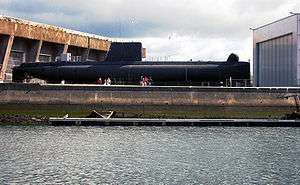French submarine Minerve (S647)
 Flore, sister ship of Minerve | |
| History | |
|---|---|
| Name: | Minerve |
| Namesake: | Minerva |
| Builder: | Chantiers Dubigeon, Nantes |
| Laid down: | May 1958 |
| Launched: | 31 May 1961 |
| Completed: | 31 May 1961 |
| Commissioned: | 10 June 1964 |
| Homeport: | Toulon |
| Fate: | Sank 27 January 1968 |
| General characteristics [1] | |
| Class and type: | Daphné-class submarine |
| Displacement: | |
| Length: | 57.75 m (189 ft 6 in) |
| Beam: | 6.74 m (22 ft 1 in) |
| Depth: | 5.25 m (17 ft 3 in) |
| Propulsion: |
|
| Speed: |
|
| Range: | 10,000 nmi (19,000 km; 12,000 mi) at 7 knots (13 km/h; 8.1 mph) surfaced |
| Endurance: | 30 days |
| Test depth: | 300 m (980 ft) |
| Complement: |
|
| Sensors and processing systems: |
|
| Electronic warfare & decoys: | ARUR 10B radar detector |
| Armament: |
|
Minerve was a French submarine, one of nine of the Daphné class. The relatively small submarine was an experimental missile-carrying submarine with a diesel engine. She had a maximum speed of 15 knots (28 km/h; 17 mph).
Service history
Minerve was laid down in May 1958 at the Chantiers Dubigeon shipyard in Nantes, and launched on 31 May 1961. After a shakedown cruise to Londonderry Port, Bergen, and Gothenburg in November 1962, the submarine sailed from Cherbourg to Toulon, arriving on 22 December 1962. She was commissioned into the 1st Submarine Squadron on 10 June 1964. Minerve operated solely in the Mediterranean, and was refitted at Missiessy Quay, Toulon, in 1967.[2]
Loss
On 27 January 1968 at 07:55 hrs, Minerve was travelling just under the surface using her snorkel, roughly 25 nautical miles (46 km) from her base in Toulon, when she advised an accompanying Breguet Atlantic aircraft that she would be at her berth in about an hour; 52 crew, including six officers, were on board. She was never heard from again. She was lost in waters between 1,000 metres (3,300 ft) and 2,000 metres (6,600 ft) deep.[3]
Commander Philipe Bouillot later said that Minerve's new captain Lieutenant André Fauve had spent 7,000 hours submerged over four years on submarines of the same class and never had a problem. The only factor known that could have caused her to sink was the weather, which was extremely bad at the time of her loss.[3]
The French Navy promptly launched a search for the missing submarine mobilizing numerous ships, including the aircraft carrier Clemenceau and the submersible SP-350 Denise under the supervision of Jacques Cousteau, but found nothing, and the operation was called off on 2 February. However, the search for Minerve, under the name Operation Reminer continued into 1969 and utilized the submersible Archimède and the US survey ship USNS Mizar. To this day no trace of the vessel has been found.[4]
Minerve was lost at about the same time as the INS Dakar (a few days apart), over 1,450 miles (2,330 km) away. Two more submarines were lost to unknown causes in the same year, the Soviet submarine K-129 and the US submarine USS Scorpion.
References
- ↑ Roche, Jean-Michel (2012). "Sous-marin Minerve : Caractéristiques principales". netmarine.net (in French). Retrieved 6 February 2013.
- ↑ Roche, Jean-Michel (2012). "Sous-marin Minerve". netmarine.net (in French). Retrieved 6 February 2013.
- 1 2 "La tragédie de la Minerve" (in French). Retrieved 22 September 2013.
- ↑ Roche, Jean-Michel (2012). "Historique du sous-marin Minerve". netmarine.net (in French). Retrieved 6 February 2013.